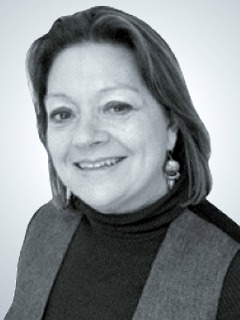A few years ago, I spotted a familiar face in an unfamiliar setting. At a funeral at St Barnabas in Ealing I bumped into Fiona Jack, managing director of Green Light International and a former AQR chair, only now in clerical garb as she splits her time being a curate and a qualitative researcher.
It is an extraordinary calling that had been bubbling beneath the surface for 25 years or more. In 2006, a fellow female priest invited her to a silent religious retreat they were leading in Glastonbury, an area she'd always thought of as special, with an aura of mystery and mystique.
"It was amazing," Fiona says, and when one afternoon she found herself sitting alone in the grounds of Glastonbury Abbey, she felt a "tap on the shoulder". She returned home buoyed by the experience but, since she had a three-year-old son and another child on the way, put it on the back burner until some six years ago.
Ordination candidate
It was then that she became an empty nester. The child she'd been carrying at Glastonbury had just left for university and so she decided that maybe now was the time to explore that thought. She put herself forward as a candidate for ordination into the Church of England, but it was not, she says, a straightforward process.
"It's not like a job interview so it's very difficult to know how to pitch it," she says, "although there are certain criteria that you know they are looking for." The Bishop's Advisory Panel (or BAP for short) involves numerous interviews by individuals from different walks of life, some from the Church and others lay people. For Fiona it was a three-day residential affair just outside Ely in December 2016.
Google the process online and you will find it is not for the faint hearted. Indeed, it's even rumoured that it takes some of its techniques from the officer recruitment process at Sandhurst. Fiona, though, came through intact and was told a week after that she'd been accepted.
She had been so determined to give herself the best start she could that she'd already signed up to learn classical Greek at Birkbeck before the interview, commencing in September 2016. For those like me who wonder why, it's because the Gospels were written in Koine, a simplified version of classical Greek.
The training proper, though, started at Sarum College in Salisbury the following September, the terms following educational semesters. It involved 17/18 hours-worth of reading a week, two essays per module, and deadlines over a three-year period, ending in 2020. Most of her fellow attendees were either teachers or came from one of the caring professions.
The two worlds are not, she says, too far apart and indeed some skills are transferable. It is, like qual, a listening rather than a talking profession, and about being open to the nuances of what people are not saying. Working under pressure and to deadlines also comes in handy, as does having a training incumbent (her vicar) with a background in advertising in Johannesburg and who "gets commercial imperatives".
It can be tough, though, compartmentalising both parts of her life. She tries to focus on Green Light work on Tuesday, Wednesday, and Thursday, and on her duties as a curate on Friday, Sunday and Monday, with Saturday (if she's very lucky), her day off.
But she relishes the challenge, and it's provided her with some memorable moments. Top of the list is her ordination at St Paul's Cathedral in the middle of lockdown. Normally played out to a packed congregation of thousands, the pandemic limited her to just four guests.
"The Bishop of London, Sarah Mullally, did 12 ordinations in a weekend instead of just one. It was incredible," she says. "There were five candidates sitting in a semi-circle under the Great Dome of St Paul's Cathedral. The intimacy, the bishop, and God made it more special."
Another moment that sticks in her mind came after she was 'priested' in July and celebrated her first eucharist (holy communion) the day after. The worries built, in terms of doing something wrong and the sense of responsibility involved. But, as she pointed out: "It is not as though I am doing anything: I am just a conduit for the Holy Spirit".
The most valuable thing that her new role has brought is a sense of perceptiveness. But her commercial background has stood her in good stead, too. "It's helpful when thinking about how to promote an event, say, or how to attract more children. You get to use skills learnt from research, or marketing principles."
Je ne regrette rien
She is now what is called a self-supporting minister, and two years into her curacy. "I've never regretted it, and just wonder why I didn't do it years ago," she says. "There was an immediate sense of coming home. This is what I was supposed to do."
Fiona has also recently been elected to General Synod (the governing body of the Church of England). "I want to shake things up a bit and at least I now have a voice," she says. Just in time for the firework season.


